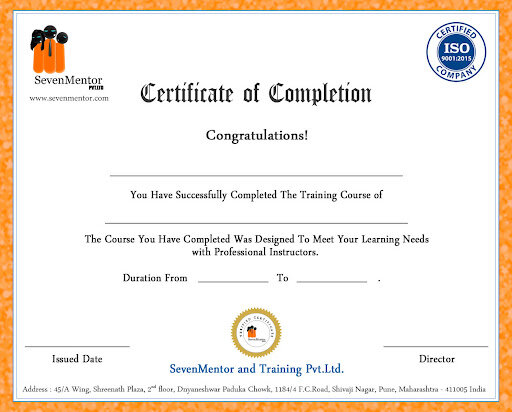CCNA Voice/Collaboration
CCNA Collaboration course is the ultimate educational program for engineers pursuing the Cisco Certified Network Associate Collaboration (CCNA Collaboration) certification.
Call The Trainer
Batch Timing
- Regular: 2 Batches
- Weekends: 2 Batches
Request Call Back
Class Room & Online Training Quotation
2500+
7200+
600+
2000+
Course video & Images



Key Features
Skill Level
Beginner, Intermediate, Advance
We are providing Training to the needs from Beginners level to Experts level.
Course Duration
90 Hours
Course will be 90 hrs to 110 hrs duration with real-time projects and covers both teaching and practical sessions.
Total Learners
2000+ Learners
We have already finished 100+ Batches with 100% course completion record.
Assignments Duration
50 Hours
Trainers will provide you the assignments according to your skill sets and needs. Assignment duration will be 50 hrs to 60 hrs.
Support
24 / 7 Support
We are having 24/7 Support team to clear students’ needs and doubts. And special doubt clearing sessions every week.
Our Placement Process

Eligibility Criteria

Placements Training

Interview Q & A

Resume Preparation

Aptitude Test

Mock Interviews

Scheduling Interviews

Job Placement
Batch Schedule
| DATE | COURSE | TRAINING TYPE | BATCH | CITY | REGISTER |
|---|---|---|---|---|---|
| 07/04/2025 |
CCNA Voice/Collaboration |
Classroom / Online | Regular Batch (Mon-Sat) | Pune | Book Now |
| 08/04/2025 |
CCNA Voice/Collaboration |
Classroom / Online | Regular Batch (Mon-Sat) | Pune | Book Now |
| 05/04/2025 |
CCNA Voice/Collaboration |
Classroom / Online | Weekend Batch (Sat-Sun) | Pune | Book Now |
| 05/04/2025 |
CCNA Voice/Collaboration |
Classroom / Online | Weekend Batch (Sat-Sun) | Pune | Book Now |
CCNA Voice/Collaboration Exams & Certification
SevenMentor Certification is Accredited by all major Global Companies around the world. We provide after completion of the theoretical and practical sessions to fresher’s as well as corporate trainees.
Our certification at SevenMentor is accredited worldwide. It increases the value of your resume and you can attain leading job posts with the help of this certification in leading MNC’s of the world. The certification is only provided after successful completion of our training and practical based projects.
About CCNA Voice/Collaboration
The Cisco Certified Network Associate Collaboration (CCNA Collaboration) validates associate-level knowledge and skills required to administer a collaboration network. The Cisco CCNA Collaboration certification confirms that the specified skill set for specialized job roles together technologies like collaboration technologies administrator, collaboration engineer, and collaboration manager. It validates skills in VoIP technologies like IP PBX, IP telephony, handset, call control, and collaboration mail solutions.
The Cisco Certified Network Associate Collaboration (CCNA Collaboration) validates associate-level knowledge and skills needed to administer a cooperation system. The Cisco CCNA Collaboration certificate verifies that the skill set in collaboration technologies like cooperation engineer cooperation technologies secretary, and cooperation supervisor for job functions. It implements abilities in technology like IP telephony, IP PBX, telephones, phone management, and cooperation email solutions. The CCNA Collaboration Certification assesses knowledge and skills associated with this Cisco Unified Communications Manager 11.X (CUCM) 11.X. Organizations ordinarily employ it like big businesses, governments, and schools. Moreover, the CCNA Collaboration Certification assesses knowledge and skills associated with this Cisco Call Manager Express (CME) and Cisco Unity Express (CUE) solutions typically employed by medium and tiny organizations such as employers that have less than 2,000 workers, retail companies, and small school districts.
CCNA Collaboration Recertification
CCNA Collaboration certifications are valid for three years. To recertify, pass ONE of the following before the certification expiration date: Pass any current CCNA Concentration exam (wireless, or security, or voice, or SP Ops), or Pass any current 200-XXX Professional-level exam, or Pass any current Cisco Specialist exam (excluding Sales Specialist exams or forum Specialist exams or Implementing Cisco Telepresence Installations [ITI] exams), or Pass any current CCIE Written Exam, or Pass the current CCDE Written Exam OR current CCDE Practical Exam, or Pass the Cisco Certified Architect (CCAR) interview and therefore the CCAR board review to increase lower certification
Online Classes
Online CCNA Voice/Collaboration Training:
With the advancement of Cisco's CCNA Video and CCNA Voice confirmations emerges the new Cisco CCNA Collaboration certification. With voice-and video advances combining perpetually in its realm, it is a confirmation that will just develop in height and request. Though this Online CCNA Collaboration Training student will figure out how to make and change clients, represents Cisco Unified Communications Manager, arrange voice informing, keep up a Cisco Unified correspondences framework, and give end client support.
In this Online CCNA Collaboration Training Live Labs is a bolt-on option that gives students the chance to increase user experience on genuine servers, switches, and changes from the solace of your own home. In Online CCNA Collaboration Training, with Live Labs, you will access an open-finished reenactment where you can try, commit errors, and assemble custom labs to chip away at all throughout the duration of your Online CCNA Collaboration Training.
Course Eligibility
There are no such eligibility criteria for the CCNA Collaboration certification. Generally, recommended that you have 1–3 years of experience working in communications, voice, video, and/or collaboration network environment.
Syllabus CCNA Voice/Collaboration
Exam Description: The Cisco Certified Network Associate (CCNA) Routing and Switching composite exam (200-125) is a 90-minute, 50–60 question assessment that is associated with the CCNA Routing and Switching certification. This exam tests a candidate's knowledge and skills related to network fundamentals, LAN switching technologies, IPv4 and IPv6 routing technologies, WAN technologies, infrastructure services, infrastructure security, and infrastructure management. The following topics are general guidelines for the content likely to be included on the exam. However, other related topics may also appear on any specific delivery of the exam. In order to better reflect the contents of the exam and for clarity purposes, the guidelines below may change at any time without notice.
15% 1.0 Network Fundamentals
21% 2.0 LAN Switching Technologies
23% 3.0 Routing Technologies
10% 4.0 WAN Technologies
10% 5.0 Infrastructure Services
11% 6.0 Infrastructure Security
10% 7.0 Infrastructure Management
- 1.0 Network Fundamentals
- 1.1. Compare and contrast OSI and TCP/IP models
- 1.2. Compare and contrast TCP and UDP protocols
- 1.3. Describe the impact of infrastructure components in an enterprise network
- 1.3.1. Firewalls
- 1.3.2. Access points
- 1.3.3. Wireless controllers
- 1.4. Describe the effects of cloud resources on enterprise network architecture
- 1.4.1. Traffic path to internal and external cloud services
- 1.4.2. Virtual services
- 1.4.3. Basic virtual network infrastructure
- 1.5. Compare and contrast collapsed core and three-tier architectures
- 1.6. Compare and contrast network topologies
- 1.6.1. Star
- 1.6.2. Mesh
- 1.6.3. Hybrid
- 1.7. Select the appropriate cabling type based on implementation requirements
- 1.8. Apply troubleshooting methodologies to resolve problems
- 1.8.1. Perform and document fault isolation
- 1.8.2. Resolve or escalate
- 1.8.3. Verify and monitor resolution
- 1.9. Configure, verify, and troubleshoot IPv4 addressing and subnetting
- 1.10. Compare and contrast IPv4 address types
- 1.10.1. Unicast
- 1.10.2. Broadcast
- 1.10.3. Multicast
- 1.11. Describe the need for private IPv4 addressing
- 1.12. Identify the appropriate IPv6 addressing scheme to satisfy addressing requirements in a LAN/WAN environment
- 1.13. Configure, verify, and troubleshoot IPv6 addressing
- 1.14. Configure and verify IPv6 Stateless Address Auto Configuration
- 1.15. Compare and contrast IPv6 address types
- 1.15.1. Global unicast
- 1.15.2. Unique local
- 1.15.3. Link local
- 1.15.4. Multicast
- 1.15.5. Modified EUI 64
- 1.15.6. Autoconfiguration
- 1.15.7. Anycast
- 2.0 LAN Switching Technologies
- 2.1. Describe and verify switching concepts
- 2.1.1. MAC learning and aging
- 2.1.2. Frame switching
- 2.1.3. Frame flooding
- 2.1.4. MAC address table
- 2.2. Interpret Ethernet frame format
- 2.3. Troubleshoot interface and cable issues (collisions, errors, duplex, speed)
- 2.4. Configure, verify, and troubleshoot VLANs (normal/extended range) spanning multiple switches
- 2.4.1. Access ports (data and voice)
- 2.4.2. Default VLAN
- 2.5. Configure, verify, and troubleshoot interswitch connectivity
- 2.5.1. Trunk ports
- 2.5.2. Add and remove VLANs on a trunk
- 2.5.3. DTP, VTP (v1&v2), and 802.1Q
- 2.5.4. Native VLAN
- 2.6. Configure, verify, and troubleshoot STP protocols
- 2.6.1. STP mode (PVST+ and RPVST+)
- 2.6.2. STP root bridge selection
- 2.7. Configure, verify and troubleshoot STP related optional features
- 2.7.1. PortFast
- 2.7.2. BPDU guard
- 2.8. Configure and verify Layer 2 protocols
- 2.8.1. Cisco Discovery Protocol
- 2.8.2. LLDP
- 2.9. Configure, verify, and troubleshoot (Layer 2/Layer 3) EtherChannel
- 2.9.1. Static
- 2.9.2. PAGP
- 2.9.3. LACP
- 2.10. Describe the benefits of switch stacking and chassis aggregation
- 3.0 Routing Technologies
- 3.1. Describe the routing concepts
- 3.1.1. Packet handling along the path through a network
- 3.1.2. Forwarding decision based on route lookup
- 3.1.3. Frame rewrite
- 3.2. Interpret the components of a routing table
- 3.2.1. Prefix
- 3.2.2. Network mask
- 3.2.3. Next hop
- 3.2.4. Routing protocol code
- 3.2.5. Administrative distance
- 3.2.6. Metric
- 3.2.7. Gateway of last resort
- 3.3. Describe how a routing table is populated by different routing information sources
- 3.3.1. Admin distance
- 3.4. Configure, verify, and troubleshoot inter-VLAN routing
- 3.4.1. Router on a stick
- 3.4.2. SVI
- 3.5. Compare and contrast static routing & dynamic routing
- 3.6. Compare and contrast distance vector and link state routing protocols
- 3.7. Compare and contrast interior and exterior routing protocols
- 3.8. Configure, verify, and troubleshoot IPv4 and IPv6 static routing
- 3.8.1. Default route
- 3.8.2. Network route
- 3.8.3. Host route
- 3.8.4. Floating static
- 3.9. Configure, verify, and troubleshoot single area and multi-area OSPFv2 for IPv4 (excluding authentication, filtering, manual summarization, redistribution, stub, virtual-link, and LSAs)
- 3.10. Configure, verify, and troubleshoot single area and multi-area OSPFv3 for IPv6 (excluding authentication, filtering, manual summarization, redistribution, stub, virtual-link, and LSAs)
- 3.11. Configure, verify, and troubleshoot EIGRP for IPv4 (excluding authentication, filtering, manual summarization redistribution, stub)
- 3.12. Configure, verify, and troubleshoot EIGRP for IPv6 (excluding authentication, filtering, manual summarization redistribution, stub)
- 3.13. Configure, verify, and troubleshoot RIPv2 for Ipv4 (excluding authentication, filtering manual summarization, redistribution)
- 3.14. Troubleshoot basic Layer 3 end-to-end connectivity issues
- 4.0 WAN Technologies
- 4.1. Configure and verify PPP and MLPPP on WAN interfaces using local authentication
- 4.2. Configure, verify, and troubleshoot PPPoE client-side interfaces using local authentication
- 4.3. Configure, verify, and troubleshoot GRE tunnel connectivity
- 4.4. Describe WAN topology options
- 4.4.1. Point-to-point
- 4.4.2. Hub and spoke
- 4.4.3. Full mesh
- 4.4.4. Single vs dual-homed
- 4.5. Describe WAN access connectivity options
- 4.5.1. MPLS
- 4.5.2. Metro Ethernet
- 4.5.3. Broadband PPPoE
- 4.5.4. Internet VPN (DMVPN, site-to-site VPN, client VPN)
- 4.6. Configure and verify single-homed branch connectivity using eBGP IPv4 (limited to peering and route advertisement using Network command only)
- 4.7. Describe basic QoS concepts
- 4.7.1. Marking
- 4.7.2. Device trust
- 4.7.3. Prioritization
- A. Voice
- B. Video
- C. Data
- 4.7.4. Shaping
- 4.7.5. Policing
- 4.7.6. Congestion management
- 5.0 Infrastructure Services
- 5.1. Describe DNS lookup operation
- 5.2. Troubleshoot client connectivity issues involving DNS
- 5.3. Configure and verify DHCP on a router (excluding static reservations)
- 5.3.1. Server
- 5.3.2. Relay
- 5.3.3. Client
- 5.3.4. TFTP, DNS, and gateway options
- 5.4. Troubleshoot client- and router-based DHCP connectivity issues
- 5.5. Configure, verify, and troubleshoot basic HSRP
- 5.5.1. Priority
- 5.5.2. Preemption
- 5.5.3. Version
- 5.6. Configure, verify, and troubleshoot inside source NAT
- 5.6.1. Static
- 5.6.2. Pool
- 5.6.3. PAT
- 5.7. Configure and verify NTP operating in a client/server mode
- 6.0 Infrastructure Security
- 6.1. Configure, verify, and troubleshoot port security
- 6.1.1. Static
- 6.1.2. Dynamic
- 6.1.3. Sticky
- 6.1.4. Max MAC addresses
- 6.1.5. Violation actions
- 6.1.6. Err-disable recovery
- 6.2. Describe common access layer threat mitigation techniques
- 6.2.1. 802.1x
- 6.2.2. DHCP snooping
- 6.2.3. Nondefault native VLAN
- 6.3. Configure, verify, and troubleshoot IPv4 and IPv6 access list for traffic filtering
- 6.3.1. Standard
- 6.3.2. Extended
- 6.3.3. Named
- 6.4. Verify ACLs using the APIC-EM Path Trace ACL Analysis tool
- 6.5. Configure, verify, and troubleshoot basic device hardening
- 6.5.1. Local authentication
- 6.5.2. Secure password
- 6.5.3. Access to device
- A. Source address
- B. Telnet/SSH
- 6.5.4. Login banner
- 6.5.5. Describe device security using AAA with TACACS+ and RADIUS
- 7.0 Infrastructure Management
- 7.1. Configure and verify device-monitoring protocols
- 7.1.1. SNMPv2
- 7.1.2. SNMPv3
- 7.1.3. Syslog
- 7.2. Troubleshoot network connectivity issues using ICMP echo-based IP SLA
- 7.3. Configure and verify device management
- 7.3.1. Backup and restore device configuration
- 7.3.2. Using Cisco Discovery Protocol or LLDP for device discovery
- 7.3.3. Licensing
- 7.3.4. Logging
- 7.3.5. Timezone
- 7.3.6. Loopback
- 7.4. Configure and verify initial device configuration
- 7.5. Perform device maintenance
- 7.5.1. Cisco IOS upgrades and recovery (SCP, FTP, TFTP, and MD5 verify)
- 7.5.2. Password recovery and configuration register
- 7.5.3. File system management
- 7.6. Use Cisco IOS tools to troubleshoot and resolve problems
- 7.6.1. Ping and traceroute with extended option
- 7.6.2. Terminal monitor
- 7.6.3. Log events
- 7.6.4. Local SPAN
- 7.7. Describe network programmability in enterprise network architecture
- 7.7.1. Function of a controller
- 7.7.2. Separation of control plane and data plane
- 7.7.3. Northbound and southbound APIs
Trainer Profile of CCNA Voice/Collaboration Training in Pune
SevenMentor Certification is Accredited by all major Global Companies around the world. We provide after completion of the theoretical and practical sessions to fresher’s as well as corporate trainees.
Our certification at SevenMentor is accredited worldwide. It increases the value of your resume and you can attain leading job posts with the help of this certification in leading MNC’s of the world. The certification is only provided after successful completion of our training and practical based projects.
Proficiency After Training
- Learn the Concept Component, Architecture, features of Communication System
- Learn how to manage and monitor interconnected System
- Work on Voice Messaging and Presence
- Learn Cisco Unified Communications Manager Express
- Learn Cisco Unified Communications Manager
- Master Cisco Unified Presence
- Work on Cisco Unity Connection and Make changes/add/move
Frequently Asked Questions
Students Reviews
I am satisfied with this CCNA Collaboration course because as I have gained practical knowledge with with best mock sessions and real devices. Thanks to all trainers who puts efforts in all the sessions.
- Ashraf Irani
I have completed the CCNA Collaboration in this institute. It was completed on time. Trainer having good experience and knowledge. Practical was understood, all doubts was cleared. Very nicely completed the course.
- Tukaram Patil
Good exercises, good speed, well communicated. The trainers made everyone feel very comfortable, able to contribute and take something away. Excellent.” “Excellent content and very knowledgeable trainer.
- Mayuri Gadekar
Corporate Training
During an ongoing study, it was discovered that organizations that put resources into representative preparation saw a normal 24% development in benefit. With our Corporate CCNA Collaboration Training Study whenever and from anyplace with our trainers, online courses and get not just the authorized, globally perceived course that you have pursued, yet additionally the true serenity that you have the alternative to remember hands-for preparing for your group. With our corporate CCNA Collaboration Training your IT Team can rehearse on genuine switches, servers, and changes to test new advances and gain practical experience. Our Corporate CCNA Collaboration Training will allow your team members to organise their study time so that it fits with their work schedule.

Related Courses
Have a look at all our related courses to learn from any location
CCNA (Cisco Certified Networking Associate) certification is the best first in Cisco´s line of certifications that a good networking professional must obtain in order to add huge value to his...
CCNA Security class is the greatest training tool for engineers following the Cisco Certified Network Associate Security (CCNA Security) certification.
The CCNP Certification is just one among the vital certifications from Cisco a media professional must want to proceed in his profession.
Request For Call Back
Class Room & Online Training Quotation | Free Career Counselling

